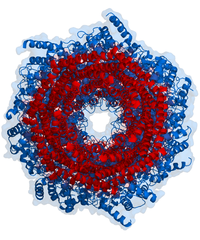
Photo from wikipedia
The 26S proteasome is a mega-dalton protein complex responsible for intracellular degradation in eukaryotes. It is composed of two subcomplexes: the 20S core particle and the 19S regulatory particle, which… Click to show full abstract
The 26S proteasome is a mega-dalton protein complex responsible for intracellular degradation in eukaryotes. It is composed of two subcomplexes: the 20S core particle and the 19S regulatory particle, which form compositionally and structurally heterogeneous proteasome complexes in cells. To fully characterize the 26S proteasome, it is necessary to understand its structural and functional diversities. Multiple mass spectrometry (MS) methodologies have been developed in recent years for the study of proteasome structural dynamics in which biochemically isolated complexes are subjected to analysis. Due to the inherent heterogeneity of proteasome complexes, single-bait affinity purification typically results in a mixture of compositionally heterogeneous complexes regardless of the baits, making accurate assessment of complex-specific conformations and functions challenging. To facilitate complex-centric analysis, we have adopted a bimolecular affinity purification method utilizing a dual-bait cell line expressing tagged 19S and tagged 20S subunits to improve the homogeneity of the resulting 26S holocomplexes. To establish the method, four types of purifications were performed and the resulting samples were extensively examined by biochemical analysis and two label-free quantitative MS methods. Our results have demonstrated the effectiveness of this purification strategy in improving the complex homogeneity for downstream biochemical and MS characterizations. This strategy will be valuable for facilitating detailed quantitative assessments of complex-specific molecular details under different conditions and can be directly adopted for studying other complexes.
Journal Title: Analytical chemistry
Year Published: 2021
Link to full text (if available)
Share on Social Media: Sign Up to like & get
recommendations!